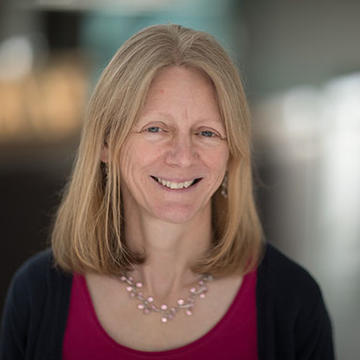Lynne Cox

Lynne Cox is a biochemist at the University of Oxford, Department of Biochemistry. Lynne is Associate Professor and expert on the molecular basis of ageing. Her lab studies the molecular basis of ageing in human cells and in model organisms, with a particular focus on cell senescence, as well as premature ageing Werner syndrome.
She was awarded a first class degree in Natural Sciences from the University of Cambridge, and stayed on in Cambridge to study with Prof Ron Laskey FRS CBE, for her PhD. Following a post-doctoral position with Prof Sir David Lane FRS in Dundee working on the tumour suppressor p53, she was awarded a Royal Society of Edinburgh Research Fellowship. This work led to two patents which contributed to the formation of the spin-out company Cyclacel.
Since moving to Oxford in 1996 to set up her own research lab, she has studied the molecular basis of ageing using longitudinal proteomics and functional approaches, as well as phenotypic screening to identify agents that can suppress the SASP and other deleterious phenotypes in senescent cells. She also has a strong interest in premature ageing Werner syndrome (WS), with the aim of identifying ways of alleviating premature senescence in human WS. In collaborative projects with Dr Robert Saunders (Open University) and Prof Alison Woollard (Biochemistry, Oxford), she has developed whole organism models of Werner syndrome in fruit flies and the nematode worm C. elegans, allowing integration of data from molecular biology and biochemical studies with whole animal biology.
She is a Trustee of the British Society for Research on Ageing, Fellow and Tutor in Biochemistry at Oriel College, Oxford, Fellow of the Royal Society of Biology, member of the Biochemical Society Clinical and Translational theme panel, and co-founded (with Katja Simon) the Oxford Ageing Network, OxAgeN. In 2014, she received the Glenn Foundation award, presented at the House of Lords, for research into the biological mechanisms of ageing.
She was awarded a first class degree in Natural Sciences from the University of Cambridge, and stayed on in Cambridge to study with Prof Ron Laskey FRS CBE, for her PhD. Following a post-doctoral position with Prof Sir David Lane FRS in Dundee working on the tumour suppressor p53, she was awarded a Royal Society of Edinburgh Research Fellowship. This work led to two patents which contributed to the formation of the spin-out company Cyclacel.
Since moving to Oxford in 1996 to set up her own research lab, she has studied the molecular basis of ageing using longitudinal proteomics and functional approaches, as well as phenotypic screening to identify agents that can suppress the SASP and other deleterious phenotypes in senescent cells. She also has a strong interest in premature ageing Werner syndrome (WS), with the aim of identifying ways of alleviating premature senescence in human WS. In collaborative projects with Dr Robert Saunders (Open University) and Prof Alison Woollard (Biochemistry, Oxford), she has developed whole organism models of Werner syndrome in fruit flies and the nematode worm C. elegans, allowing integration of data from molecular biology and biochemical studies with whole animal biology.
She is a Trustee of the British Society for Research on Ageing, Fellow and Tutor in Biochemistry at Oriel College, Oxford, Fellow of the Royal Society of Biology, member of the Biochemical Society Clinical and Translational theme panel, and co-founded (with Katja Simon) the Oxford Ageing Network, OxAgeN. In 2014, she received the Glenn Foundation award, presented at the House of Lords, for research into the biological mechanisms of ageing.